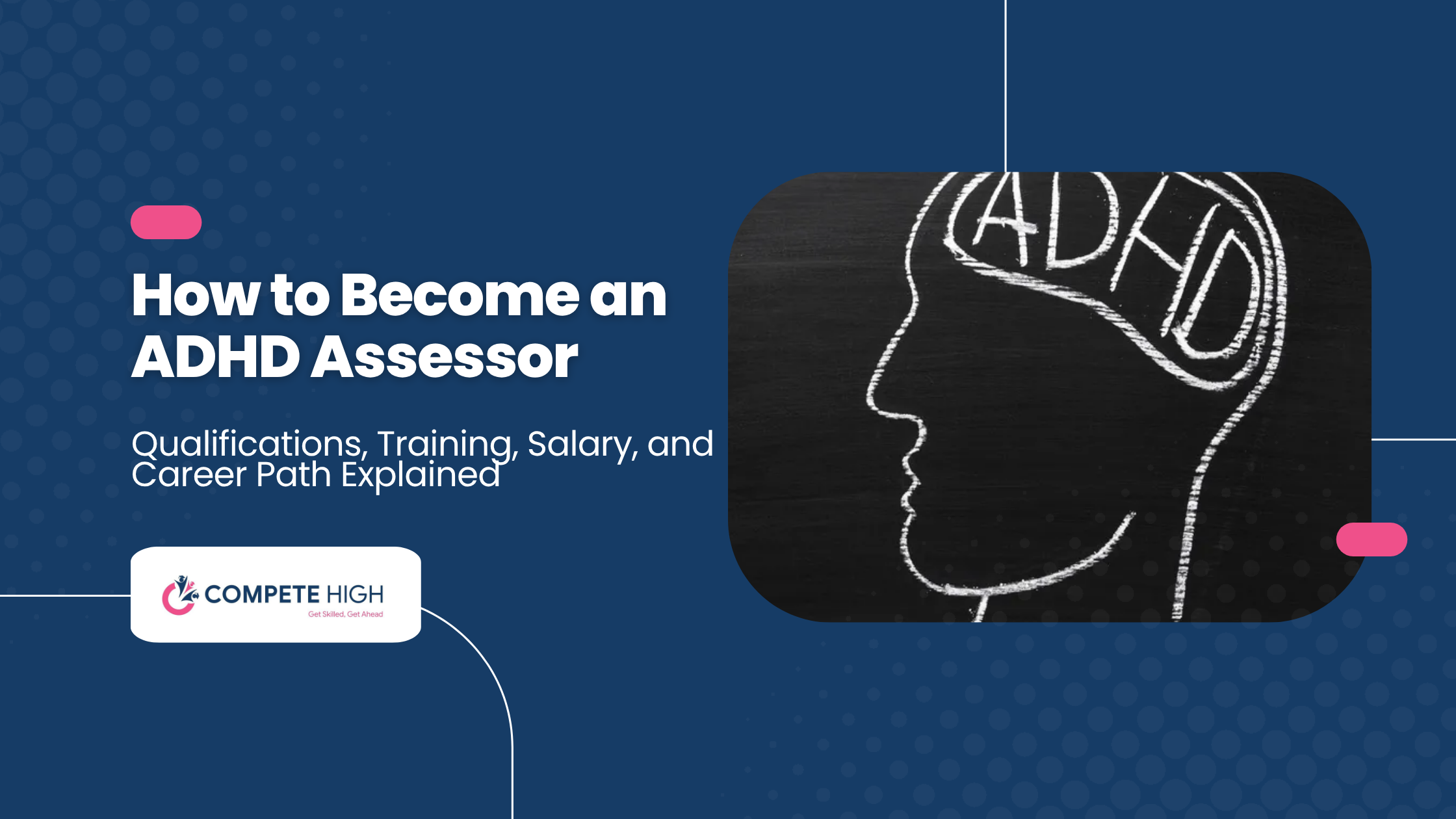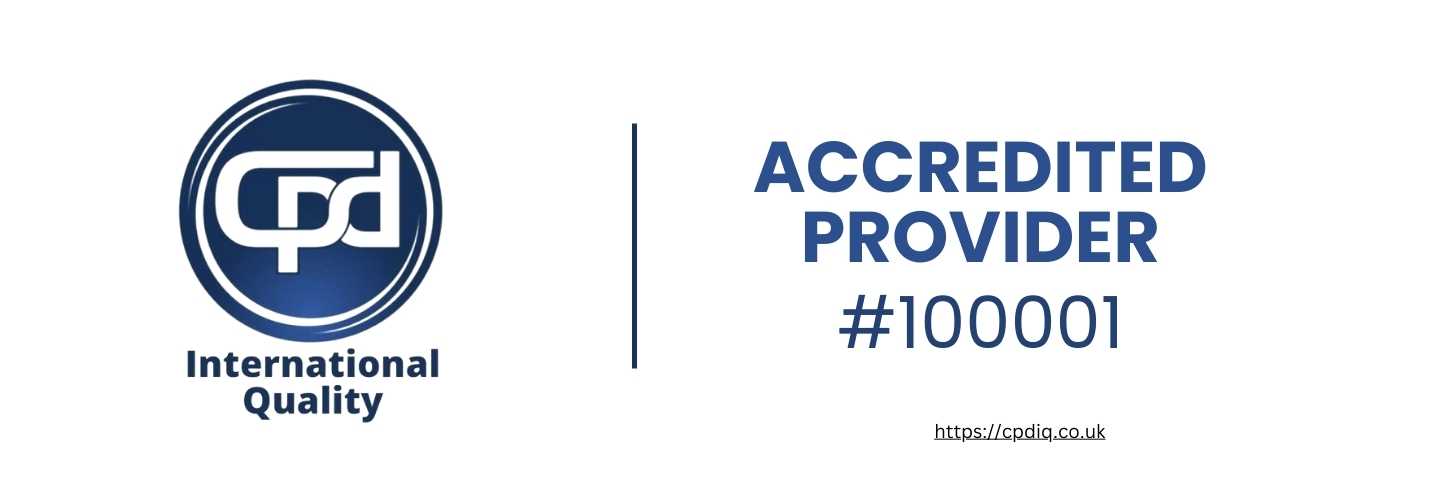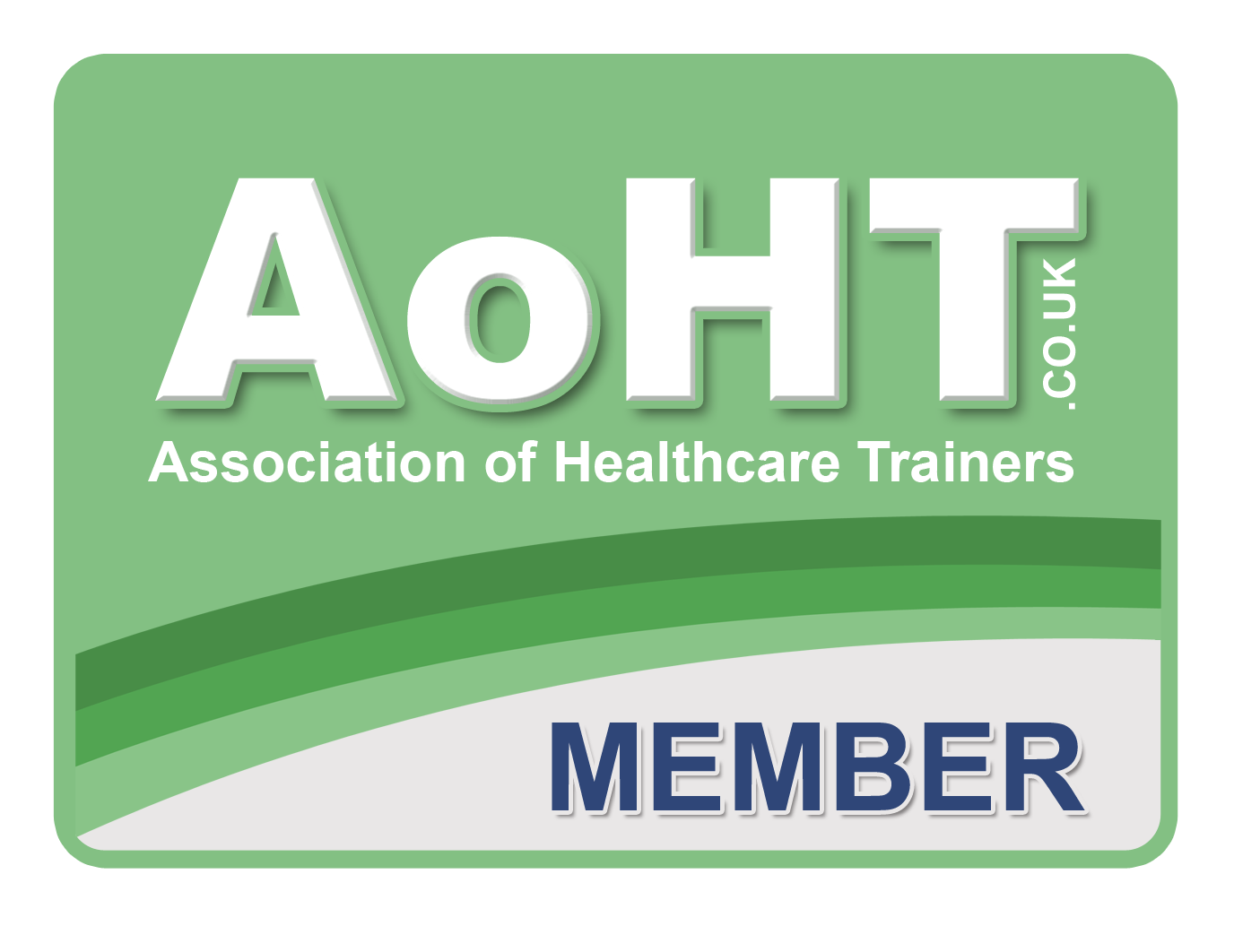
How to become an ADHD assessor — as we grow more aware of neurodiversity and mental health issues, the need for more professionals who assess and support people with ADHD (Attention Deficit Hyperactivity Disorder) continues to grow. The demand for qualified ADHD assessors has increased as schools, workplaces, and healthcare providers across the UK recognise the importance of early and accurate ADHD assessments.
But how does one become an ADHD assessor? What specific qualifications, training, and experience does one need? Many people interested in this field often ask, “What qualifications do you need to assess for ADHD?” Is the ADHD assessor career path limited to psychiatrists and psychologists, or can professionals such as counsellors, nurses, and other trained practitioners also enter this line of work?
Quick Overview
Wondering how to become an ADHD assessor? This guide outlines the UK pathways for psychologists, psychiatrists, nurses, and counsellors.
✅ Understand the assessor role and legal frameworks (NICE, HCPC, BACP).
✅ Complete accredited ADHD or neurodiversity training.
✅ Gain supervised experience and build a competency portfolio.
✅ Stay up-to-date with CPD and assessment tools like DIVA-5 and Conners.
In this guide, we’ll explore how to become an ADHD assessor, including the specific qualifications required, available training pathways, salary potential, and opportunities for career advancement. Whether you’re just starting out or already working in mental health or education, this guide will provide a clear direction for your career path in ADHD assessment.
Understanding the Role of an ADHD Assessor
It’s important to understand what an ADHD assessor does and why the role is so valuable in supporting neurodiverse individuals.

An ADHD assessor is a professional who evaluates whether a person — child or adult — meets the diagnostic criteria for ADHD, according to the DSM-5 or ICD-11. They compile information from a variety of sources to form a full picture of an individual’s strengths, challenges, and symptoms.
This process can include:
- Conducting structured interviews with the individual and family members
- Evaluating the person’s medical, psychological, or educational history
- Administering ADHD-appropriate standardised tools and questionnaires
- Observing behaviour, attention, and executive functioning
- Collaborating with other professionals such as GPs, psychiatrists, teachers, or workplace assessors
In the UK, ADHD assessors can work in a variety of settings, including:
- NHS mental health services
- Private clinics or assessment centres
- Educational institutions (universities, schools, and colleges)
- Occupational health or workplace neurodiversity services
- Independent psychology and counselling practices
ADHD presents differently in each person and can often co-exist with conditions such as anxiety, autism, or dyslexia. Therefore, ADHD assessors need a strong understanding of clinical psychology, communication skills, and the ability to interpret complex behavioural information.
If you’re interested in how to become an ADHD assessor or even how to become a neurodiversity assessor, developing this mix of clinical knowledge and empathy is key.
The Importance of ADHD Assessments
The UK has seen a significant rise in ADHD awareness and diagnosis in recent years. Once viewed primarily as a childhood behavioural disorder, ADHD is now recognised as a lifelong neurodevelopmental condition that can impact people of all ages.
This growing awareness has led to:
- Increased demand for assessments, resulting in 12–24 month waiting lists for NHS ADHD assessments in some areas
- The expansion of private and hybrid services that offer faster diagnoses
- A rise in workplace ADHD and neurodiversity assessments under the Equality Act 2010
As both the NHS and private practices seek more qualified professionals, understanding what qualifications you need to assess for ADHD has become increasingly important.
In summary, assessing ADHD is a rewarding and meaningful career path — ideal for those with a background in mental health, education, or psychology. It offers the opportunity to combine analytical skills with compassion and communication, making a genuine difference in people’s lives.
What is Required to Assess for ADHD
The requirements to assess for ADHD depend on the extent of the assessments you wish to carry out and whether you will be working as part of a multi-disciplinary team (alongside a medical professional) or independently. Understanding what qualifications you need to assess for ADHD can help you choose the right training and professional pathway.
If you are exploring how to become an ADHD assessor or even how to become a neurodiversity assessor, the following routes outline the main qualification and career pathways available in the UK.
1. Clinical or Counselling Psychologist Route
Qualification: Doctorate in Clinical or Counselling Psychology (HCPC-registered)
Eligibility: Psychologists can independently conduct ADHD assessments and provide formal diagnoses, often alongside other psychological evaluations.
Pathway:
- Earn a British Psychological Society (BPS)-recognised psychology degree
- Complete postgraduate training in clinical or counselling psychology
- Gain supervised experience working with ADHD and neurodiverse clients
- Register with the Health and Care Professions Council (HCPC)
Overview:
Psychologists are among the most common ADHD assessors in both NHS and private practice due to their diagnostic authority and ability to provide comprehensive psychological assessments.
2. Psychiatrist Route
Qualification: Medical degree (MBBS/MBChB) with psychiatric specialisation
Eligibility: Psychiatrists are medically qualified doctors who can diagnose ADHD and prescribe medication when necessary.
Pathway:
- Complete a recognised medical degree
- Undertake foundation training and specialise in psychiatry
- Join a professional body such as the Royal College of Psychiatrists

Overview:
Psychiatrists often lead ADHD assessment teams, particularly for complex or coexisting (comorbid) cases. Their medical expertise allows them to integrate diagnostic assessment with treatment and medication management.
3. Specialist Nurse or Mental Health Practitioner Route
Qualification: Nursing degree (RMN, RN, or equivalent) with additional ADHD or neurodevelopmental assessment training
Eligibility: Specialist nurses play an important role in ADHD care, often conducting initial screenings, managing ongoing care, and collaborating with psychiatrists and psychologists for diagnosis.
Pathway:
- Gain NMC registration as a qualified nurse
- Undertake training in ADHD assessment tools, neurodiversity awareness, and clinical observation
- Work within an NHS ADHD clinic, private practice, or community mental health team
Overview:
Many nurses progress into roles as ADHD Nurse Specialists, where they conduct structured assessments under supervision and provide valuable post-diagnosis support. This route is ideal for those exploring how to become an ADHD assessor through a clinical nursing background.
4. Counsellor or Therapist Route
Qualification: Diploma or degree in counselling or psychotherapy, with additional ADHD or neurodiversity assessment training
Eligibility: Counsellors cannot usually make formal medical diagnoses but can play a vital part in the assessment process — gathering behavioural information, supporting clients before and after assessment, and contributing within multi-disciplinary teams.
Pathway:
- Obtain accreditation through BACP, UKCP, or NCS
- Complete CPD courses in ADHD awareness, screening, and assessment tools
- Collaborate with psychologists or psychiatrists for diagnostic pathways
Overview:
This is an excellent route for those interested in how to become a neurodiversity assessor or expanding their counselling expertise into ADHD and neurodiverse support. Counsellors in this role focus on holistic understanding and client wellbeing rather than formal diagnosis.
Can a counsellor become an ADHD assessor?
Yes, but with certain restrictions. ADHD-assessing counsellors are expected to practise under specialist supervision and usually as part of a multi-disciplinary diagnostic team, rather than working independently.
Pre-assessment interviews are an important stage in the process, helping to gather detailed background information. This stage often includes using and scoring recognised ADHD screening tools such as the Conners Rating Scale and the DIVA-5.
Counsellors involved in ADHD assessments may also deliver psychoeducation and provide post-assessment support to help clients understand and manage their diagnosis.
With enough supplemental study, practical experience, and appropriate supervision, counsellors may progress into roles such as neurodiversity assessor, ADHD case manager, or therapeutic assessor within the private or educational sectors.
This approach has become increasingly popular as more organisations recognise the value of professionals who can combine emotional insight with practical assessment skills.
For those exploring how to become an ADHD assessor or wondering how to get trained to do ADHD assessments, this pathway offers an excellent opportunity to develop specialist skills while working collaboratively within a structured diagnostic framework.
Becoming a Neurodiversity Assessor
Training as a neurodiversity assessor is an excellent choice if you want to support people across a broader spectrum of neurodevelopmental conditions, including ADHD, autism, dyslexia, and dyspraxia.
A neurodiversity assessor evaluates a client’s cognitive, behavioural, and sensory processing profiles to build a holistic understanding of how they experience and interact with the world. These roles frequently exist within:
- Educational psychology services
- Workplace adjustment assessment providers
- University disability support services
Training typically includes:
- A relevant degree in psychology or a related field such as education, occupational therapy, or counselling
- Additional courses or CPD modules in ADHD, autism, and specific learning difficulties (SpLDs)
- Supervised placements under clinically qualified professionals

Many professionals begin their journey by learning how to become an ADHD assessor, developing core diagnostic and assessment skills before expanding their expertise to include the wider neurodiversity spectrum. This progression allows practitioners to provide more comprehensive assessments and support for individuals with diverse cognitive profiles.
How to Get Started with ADHD Assessments in the UK
If you want to assess ADHD and are wondering how to become an ADHD assessor, you will need more than an interest in psychology and neurodiversity. This involves more than just taking a few classes — you will need to have the clinical skills and hands-on experience with the right assessment tools to gauge the psychological condition. There are various training options in the UK depending on your career. You may come from a counselling, nursing, psychology, or teaching background.
Building confidence and qualifications to provide this type of service will require the following training to assess ADHD.
1. Understand the Legal and Professional Framework
Understanding the governing standards for ADHD assessment in the UK will provide the best groundwork prior to enrolling in any training.
In both the NHS and the private sector, ADHD assessments must adhere to the standards set out by:
- NICE (National Institute for Health and Care Excellence) – specifically the NICE Guideline NG87, which outlines the best practices for diagnosing and managing ADHD.
- Royal College of Psychiatrists (RCPsych) – professional standards regarding the psychiatric aspects of ADHD.
- Health and Care Professions Council (HCPC) – which oversees clinical psychologists and regulations to ensure the safe practice regarding assessments.
These guidelines help maintain assessments that are ethical, evidence-based, and consistent. Familiarising yourself with these frameworks will help you understand who can legally make the diagnosis and how a multi-disciplinary team functions.
2. Enrol in a Recognised ADHD or Neurodevelopmental Training Programme
Completing specialist training that integrates theoretical aspects and practical assessment frameworks is necessary to become an ADHD assessor. Depending on your background, there are a few primary routes. If you’re wondering can a counsellor become an ADHD assessor, the answer is yes — with the right training, supervision, and experience, counsellors can play an active role within multi-disciplinary ADHD assessment teams.
A. Clinical Professionals (Psychologists, Psychiatrists, Nurses)
For those who work in mental health or healthcare, you might first consider CPD-accredited courses, which include:
- The ADHD Foundation Training Courses – covering child and adult assessment frameworks.
- Maudsley Learning (South London and Maudsley NHS Trust) – offering professional ADHD and neurodevelopmental training.
- Royal College of Psychiatrists – continuing professional development modules in ADHD assessment and management.
- University-based postgraduate courses – such as MSc/PGDip in Neurodevelopmental Disorders or Clinical Neuropsychology.
These programmes combine theoretical modules with supervised clinical practice.
B. Counsellors, Coaches, or Allied Health Professionals
If you’re from a counselling, education, or wellbeing background, you can pursue:
- ADHD Awareness and Screening Training – CPD courses introducing ADHD symptoms, comorbidities, and communication strategies.
- Neurodiversity Assessor Training – courses focusing on administering and interpreting screening tools like DIVA-5 or Conners’ Scales.
- Level 5/6 Diplomas in ADHD and Mental Health Practice – for those looking to expand into structured assessments and case management roles.
While these do not grant diagnostic authority, they prepare you for roles supporting clinicians in multidisciplinary teams or working as ADHD case assessors.
3. Master Standardised Tools for ADHD Assessment
Being an ADHD assessor entails mastering the use and interpretation of structured diagnostic tools. This reinforces diagnostic accuracy and guarantees alignment with the standards expected in the field.
Prominent tools in ADHD assessment include the following:

- DIVA-5 (Diagnostic Interview for ADHD in Adults) – an international semi-structured interview for adult diagnosis.
- Conners' Comprehensive Behaviour Rating Scales (CBRS) – assesses children and adolescents for ADHD and associated disorders.
- Vanderbilt ADHD Diagnostic Rating Scales – mainly used in educational and paediatric settings.
- QbCheck/QbTest – computer-based attention and impulsivity assessments, frequently used in private ADHD assessments in the UK.
- SNAP-IV Questionnaire – a screening tool for use in the classroom by teachers and parents.
Many training organisations provide practical workshops or online modules focusing on the responsible and effective use of these tools.
4. Gain Supervised Clinical Experience
Getting hands-on experience after finishing your formal training is important. In the UK, new assessors of ADHD gain supervised experience under the care of psychologists or psychiatrists.
In this supervised practice, you will:
- Watch assessments and clinical interviews.
- Collect background case data (school reports, medical history, etc.).
- Administer rating scales and questionnaires.
- Take part in discussions on multi-disciplinary cases.
- Draft reports for clients or write GP referral letters using your structured report as a template.
These supervised experiences will help you learn how to make informed decisions, work with clients effectively, and build the confidence needed to practise independently.
If you are a counsellor or educator, joining or volunteering with ADHD assessment clinics, SEN schools, or neurodiversity charities will also provide this supervised experience.
5. Get Relevant Registration or Accreditation
Depending on your professional background, registration with a recognised body is important to build credibility and accountability.
Common registrations and accreditations include:
- HCPC (Health and Care Professions Council) – for psychologists and occupational therapists
- GMC (General Medical Council) – for psychiatrists and medical doctors
- NMC (Nursing and Midwifery Council) – for mental health nurses
- BACP or UKCP – for counsellors and psychotherapists
- ADHD Professionals Association (UK) – for professionals working in ADHD assessment and management
Professional registration shows ethical standards and competence, but it does not automatically grant diagnostic privileges.
6. Portfolio of Competencies
Many ADHD assessor training programmes now include maintaining a competency portfolio to document learning and supervised experience.
Your portfolio may include:
- Accredited ADHD course certificates
- Supervised case reports or observations
- Client testimonials or self-reflections
- Continuing professional development activities
- Letters of supervision or endorsement from a qualified clinician
Having this evidence strengthens your professional standing and creates opportunities for advancement.
7. Continuing Professional Development (CPD)
Education does not end at qualification. Research into ADHD continues to evolve, and keeping up with new tools, policies, and insights ensures that you remain effective and compliant.
CPD activities may include:
- ADHD conferences and workshops
- Online refresher courses (e.g. Maudsley Learning or ADHD Foundation)
- Reading The ADHD Report or The British Journal of Psychology
- Joining peer supervision or mentoring groups

Many ADHD assessors later expand into related areas such as autism evaluation, executive function coaching, and educational psychology, broadening their expertise and employability.
Can People Who Are Not Clinicians Train to Conduct ADHD Assessments?
Yes, with some restrictions.
If you are exploring how to become an ADHD assessor but are not a psychiatrist, psychologist, or nurse practitioner, you can still train to assist with ADHD screenings or pre-assessments — provided you work under the supervision of a qualified clinician. People in these supporting roles are commonly found in:
- Private assessment clinics as neurodiversity screeners or case coordinators
- Educational settings as SEN support staff
- Workplace neurodiversity services, where trained professionals conduct initial employee ADHD screenings
While non-clinicians cannot make formal diagnoses, their contribution is pivotal to the overall assessment process. They gather essential background information, support clients before and after the clinical evaluation, and play an important role in improving access to ADHD assessment services.
Career Prospects for Assessing ADHD in the UK
If you are exploring how to become an ADHD assessor or how to become an ADHD evaluator, gaining the necessary training and qualifications opens up a variety of rewarding career opportunities. ADHD is increasingly recognised in both children and adults, which has contributed to long waiting times in the NHS and created ample opportunities across healthcare, education, and the private sector.
Here are some of the most notable professional settings and what you might expect from each:
1. NHS and Public Sector Roles
Many qualified assessors work within NHS mental health trusts or community paediatric services. These roles primarily focus on diagnostic assessments for children and adolescents referred by GPs or schools.
Within the NHS, ADHD assessors may include:
- Clinical psychologists conducting full assessments
- Specialist ADHD nurses collaborating with psychiatrists on diagnosis and medication management
- Assistant psychologists or practitioners gathering information and administering screening tools
Working in the NHS enhances experience in multi-disciplinary practice, allowing you to work alongside doctors, occupational therapists, speech and language therapists, and educators. The environment can be competitive, with roles predominantly requiring HCPC or NMC registration.
2. Private ADHD Clinics and Neurodiversity Centres
With NHS waiting times often long, many families and adults turn to private ADHD assessments. Private assessors are highly sought after because they can adjust their hours and receive competitive remuneration.
Private ADHD assessors typically:
- Conduct diagnostic assessments for adults and children
- Administer and interpret ADHD-specific assessment tools (e.g., DIVA-5, QbCheck)
- Develop comprehensive reports for clients to share with GPs or schools
- Deliver pre- and post-assessment counselling, coaching, and reinforcement
Private clinics often hire both medical professionals and trained non-medical staff. Remote assessments are also increasingly common, particularly since the pandemic.
3. Educational Settings
Schools, colleges, and universities engage ADHD specialists to support pupils and students with ADHD or related learning challenges. These professionals may:
- Carry out screening assessments for students showing ADHD traits
- Communicate with Special Educational Needs Coordinators (SENCOs)
- Aid in developing ADHD accommodations in teaching and learning
- Draft assessment reports for EHCPs and university disability provisions
This path is particularly rewarding for professionals from teaching, psychology, or counselling backgrounds.
4. Corporate and Workplace Neurodiversity Services
Employers are increasingly recognising ADHD as part of the neurodiversity spectrum. Workplace assessors provide ADHD and autism evaluations so employees can receive reasonable adjustments such as flexible work hours, quiet spaces, or support with task management.
Workplace assessors often collaborate with:
- Occupational health companies
- Corporate wellbeing providers
- Private neurodiversity consultancies
Typical duties include drafting reports, advising employers on compliance with the Equality Act 2010, and recommending reasonable adjustments.
5. Self-Employment and Consultancy
After gaining experience, many ADHD assessors move into private practice or freelance consultancy. With the appropriate insurance and paperwork, self-employment is possible for psychologists, nurses, and counsellors.
Freelance work allows you to build your practice according to your preferences: you can choose the type of assessments you conduct, the hours you work, and the clients you support. However, you are also responsible for managing the legal and business aspects of your practice.
Salary Expectations for ADHD Assessors in the UK
If you are exploring how to become an ADHD assessor or how to become an ADHD evaluator, it’s useful to understand the potential earnings at different stages of your career. Salaries in the UK vary depending on education, experience, professional registration, and the type and location of work. Here’s an overview of what you might expect:
1. Entry-Level Roles
New assessors and assistant practitioners—such as counselling professionals working under supervision or psychology graduates—typically start with salaries in the range of £25,000 to £32,000. These roles are usually based in the NHS or educational settings and represent the first steps in a career in ADHD assessment.
Entry-level practitioners perform preliminary work, including gathering assessment histories and assisting senior staff with multidisciplinary collaboration.
2. Mid-Level Professionals
Mid-level ADHD specialists and assigned staff with more experience can expect salaries between £35,000 and £50,000, depending on responsibilities and work setting. Professionals at this level may also work in private clinics, where rates for ADHD assessments vary based on assessment complexity, client type, and documentation requirements—typically ranging from £250 to £500 per assessment.
3. Senior and Specialist Assessors
Experienced clinical psychologists or consultant psychiatrists who lead assessment teams can earn between £60,000 and £100,000 or more.

Senior ADHD specialists with additional responsibilities—such as medication reviews, supervision of junior staff, or ownership of private practices—may earn even higher salaries.
4. Freelance or Private Practice Rates
Many ADHD assessors choose flexible freelance work. Typical private rates for a full ADHD assessment (including interviews, testing, and comprehensive reports) are:
- £500–£800 for a child
- £700–£1,200 for an adult
Highly experienced professionals can charge more, particularly for follow-up sessions or complex diagnostic assessments.
The growing demand for ADHD assessments in the UK presents a strong earning potential for qualified professionals. Understanding these salary ranges is an important step for anyone considering how to become an ADHD assessor or how to become an ADHD evaluator, and can help guide career planning.
Factors That Influence ADHD Assessor Salary
If you are considering how to become an ADHD assessor or want to understand how much do ADHD assessors earn, several factors influence earnings:
- Professional Background – Psychiatrists and psychologists have the highest earning potential due to their diagnostic authority. Nurses, counsellors, and educational professionals typically earn less but often have more flexibility in their work settings.
- Work Setting – NHS assessors are on a banded salary, while private practitioners can set their own fees.
- Location – Higher demand and living costs make London and other major cities more lucrative.
- Client Base – Specialists in adult ADHD or workplace neurodiversity often earn more than those focusing solely on children.
- Experience and Reputation – Established assessors with proven outcomes, publications, or recognised expertise can command premium rates.
Additional Roles Related to ADHD Assessment
Training to become an ADHD assessor can open doors to related roles within the neurodiversity sector. Many professionals expand their expertise into broader assessment or therapeutic services, including:
- Neurodevelopmental Specialist – assessing multiple conditions such as ADHD, autism spectrum disorder (ASD), dyslexia, and dyspraxia.
- ADHD Coach – providing post-diagnostic guidance and behavioural strategies.
- Educational Psychologist – assessing learning and attention difficulties in schools.
- Mental Health Consultant – advising employers or educational institutions on inclusion and mental wellbeing.
- Trainer or Lecturer – teaching ADHD awareness and assessment techniques to professionals.
This variety makes ADHD assessment one of the most dynamic and evolving career paths within mental health and education today.
Typical Career Progression
Your career as an ADHD assessor can evolve in multiple directions depending on your qualifications and goals. A common progression route is:
- Entry-Level: Work as an assistant assessor or support staff in a clinic or school.
- Qualified Practitioner: Conduct ADHD assessments independently under supervision.
- Specialist Assessor: Lead diagnostic sessions and supervise junior staff.
- Clinical Lead or Consultant: Supervise multidisciplinary assessment teams.
- Private Practitioner or Trainer: Provide independent assessments, workshops, or training programmes for new professionals.
Each stage offers increased autonomy, higher earning potential, and opportunities to contribute to research, advocacy, and professional development within the neurodiversity field.
Step-by-Step Guide to How to Become an ADHD Assessor in the UK
Having discussed the training, career opportunities, and qualifications, it is time to lay out a clear roadmap for how to become an ADHD assessor in the UK. This guide supports strategic career planning, whether you are starting with no previous experience in healthcare or education, or building on work already done in those fields.
Step 1: Obtain a Relevant Academic Qualification
Begin by gaining a foundation in a related discipline such as:
- Psychology
- Counselling or Psychotherapy
- Nursing (especially Mental Health Nursing)
- Medicine or Psychiatry
- Occupational Therapy or Educational Psychology
Most ADHD assessor roles require at least a Level 6 qualification (Bachelor’s degree or equivalent). For some positions — especially in clinical or diagnostic settings — a postgraduate qualification or doctorate may be necessary.
If you already hold a degree in one of these areas, you’re well positioned to move on to specialist training.
Step 2: Undertake ADHD or Neurodiversity-Specific Training
Next, enrol in accredited training courses focusing on ADHD assessment and management. Look for courses that are:
- CPD-accredited (Continuing Professional Development)
- Aligned with NICE and Royal College of Psychiatrists guidelines
- Include practical components, such as simulated assessments or observation hours
Training options include:
- The ADHD Foundation (UK-based professional development programmes)
- Maudsley Learning (South London & Maudsley NHS Foundation Trust)
- Open University or University of South Wales postgraduate modules in neurodevelopmental disorders
- Private CPD providers offering courses in DIVA-5, Conners’ Scales, or QbCheck interpretation
Choose a course that suits your background and intended role. For example, counsellors may wonder: “can a counsellor become an ADHD assessor?” — starting with awareness and screening courses is suitable, while nurses or psychologists can pursue advanced diagnostic qualifications.

For those asking, “can I train to do ADHD assessments?”, these accredited courses are the formal path to gaining the knowledge and supervised practice necessary to participate in ADHD assessments under the appropriate supervision.
Step 3: Gain Supervised Experience
Hands-on experience is vital for developing confidence and clinical judgement. Seek placements, shadowing, or paid roles in:
- NHS ADHD or CAMHS teams
- Private neurodiversity clinics
- Schools and colleges (supporting SEN or inclusion departments)
- Occupational health or workplace wellbeing firms
You’ll learn how to:
- Conduct interviews and gather developmental histories
- Administer ADHD screening tools
- Interpret test results and behavioural observations
- Communicate findings clearly to clients and families
Supervised practice is also a requirement for many professional registrations — so document your experience carefully for your portfolio.
Step 4: Register with a Professional Body
Registration enhances credibility and signals your commitment to professional standards. Depending on your discipline, you may register with:
- HCPC – for psychologists and occupational therapists
- GMC – for psychiatrists
- NMC – for nurses
- BACP / UKCP / NCS – for counsellors and psychotherapists
You may also choose to join:
- ADHD Professionals Association (UK) – for assessors, nurses, and allied health practitioners
- British Psychological Society (BPS) – for psychologists specialising in neurodevelopmental assessments
These memberships often provide networking opportunities, supervision access, and CPD resources to stay current in the field.
Step 5: Develop a Professional Portfolio
As you train and gain experience, keep a record of your development. Your portfolio should include:
- Certificates of ADHD or neurodiversity training
- Case studies or anonymised reports (with client consent)
- Supervisor feedback or competency sign-offs
- Reflective practice logs
- CPD records and ongoing training evidence
This portfolio will be essential when applying for clinical roles, independent practice, or accreditation upgrades. It also serves as a personal record of your professional growth.
Step 6: Find Employment or Start Freelance Work
Once qualified, you can apply for ADHD assessor roles in:
- NHS trusts or local authority services
- Private ADHD assessment centres
- Universities and schools (especially SEN departments)
- Corporate neurodiversity consultancies
If you prefer independence, you can work as a freelance ADHD assessor or join established private clinics on a contract basis. Before starting independent practice, ensure you:
- Obtain professional indemnity insurance
- Adhere to GDPR and confidentiality policies
- Establish clear referral and supervision systems
Many private assessors combine clinical assessments with coaching, psychoeducation, or workplace training — diversifying their services and income streams.
Step 7: Continue Professional Development
The field of ADHD and neurodiversity is evolving rapidly. To remain competent and competitive, engage in continuous learning through:
- Annual CPD courses and workshops
- Attending conferences on ADHD and autism
- Joining peer supervision groups
- Reading recent research publications
- Expanding into related areas like executive functioning, co-occurring conditions, or autism assessment
Continued learning not only enhances your clinical expertise but also opens the door to senior or specialist roles in the future.
Becoming an ADHD Assessor: Challenges
Becoming an ADHD assessor is challenging, perhaps more so than in similar healthcare or psychological roles. When preparing for this career, it is important to identify and embrace the following:

- Great Emotional Demand – Clients may exhibit a profound emotional response to years of misunderstanding and frustration. You will require strong empathy and emotional resilience.
- Long Training Time – Gaining full diagnostic authority can take several years. Patience and persistence are essential for those serious about how to become an ADHD assessor.
- Legal Limitations – Formal diagnostic authority is limited to certain professionals, including psychiatrists, clinical psychologists, and nurse prescribers.
- Keeping Up with Demand – The rise in ADHD referrals across the UK means that workloads, particularly in NHS or private clinic settings, can be substantial.
- Balancing Accuracy with Compassion – Assessment must combine objective evaluation with empathetic listening, especially when working with children, adults, and their families who have been seeking answers for a long time.
ADHD Assessment Will Always Be Fulfilling
A career in ADHD assessment is rewarding because your work changes lives. Individuals seeking understanding and support can gain access to resources that significantly improve their wellbeing. For those wondering, “can a counsellor become an ADHD assessor?”, while formal diagnostic roles are restricted, counsellors play a crucial role in pre-assessment, support, and coaching, often under the supervision of qualified clinicians.
The Rewards of a Career in ADHD Assessment
ADHD assessors do more than complete forms; they make a meaningful difference in the lives of the people they work with. Assessors help individuals obtain the support they need to flourish in school, work, and personal relationships.
Some of the key rewards include:
- Assisting people on their path to self-understanding and acceptance.
- Promoting neurodiversity and fostering inclusion for neurodiverse individuals.
- Enjoying the flexible and in-demand nature of the profession.
- Engaging in ongoing educational opportunities and potential career advancement.
- Contributing to improvements in mental healthcare and healthcare systems more broadly.
Across the fields of psychology, counselling, or healthcare, this career is the convergence of science and people and, more than ever, that intersection is needed in society.
Final Thoughts
So, you ask, “how to become an ADHD assessor?” The answer is a combination of education, accredited training, and a genuine commitment to helping neurodiverse individuals fulfil their potential.
As ADHD becomes increasingly recognised in the UK, this role is both fulfilling and purposeful. ADHD assessors provide timely and compassionate evaluative services across the lifespan, from early intervention in childhood to adult workplace assessments. Every person deserves an equitable, informed, and empathetic assessment.
There is a place for you in this rewarding and expanding profession—whether you are a counsellor exploring new opportunities, a psychologist seeking to specialise, or a nurse looking to broaden your scope.
The journey begins with training, seeking supervision, and taking the first of many confident steps that are essential in this profession. Understanding how to become an ADHD assessor will guide you along a clear pathway to making a meaningful difference in the lives of those you assess.










